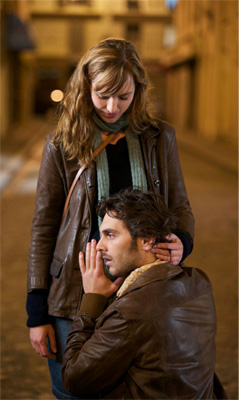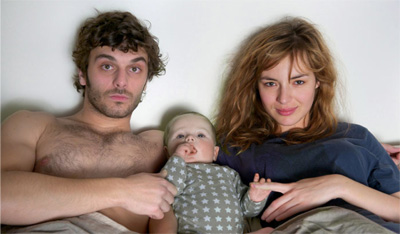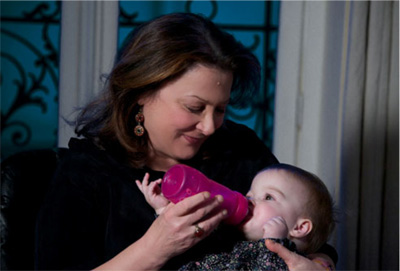Vanessa Portal & Eliette Abecassis A Happy Event Interview

Rémi Bezançon, Vanessa Portal and Eliette Abecassis A Happy Event Interview
Cast: Louise Bourgoin, Pio Marmaï, Josiane BalaskoDirector: Rémi Bezançon
Genre: Romance, Drama
Rated: MA15+
Running Time: 107 minutes
Synopsis: Barbara - intelligent, ambitious and gorgeous - is a post-graduate student, while Nicolas, replete with boyish charm, is a clerk in a video store. After a humorous courtship in the video store where Nicolas works, the pair begins a passionate romance that grows into relationship bliss. They frolic, they dine, they paint walls together and all too quickly they find themselves enthusiastically, if not slightly nervously, embarking on their biggest joint venture yet - their first child.
But what begins as a life step they decide to embrace with joyful abandon, quickly starts to change shape (both figuratively and literally) as Barbara's tummy swells with their unborn child and new pressures start to weigh on their relationship. Hormones begin to race, emotions run high and identities begin to fracture. The reality and pit-falls of child-bearing and rearing soon hits home, and despite the support of those around her, Barbara struggles to connect with her baby.
Release Date: April 12th, 2012
Interview with Rémi Bezançon, Vanessa Portal and Eliette Abecassis
A Personal StoryVanessa Portal: You can tell us now, Éliette: Barbara is you, isn't she?
Eliette Abecassis: True, I feel very close to Barbara. When I became a mother, I was surprised at the difference between what people usually say about motherhood and what I myself was feeling.
It was as if no one had ever told me the truth, as if they had been hiding from me what really happens when you have a child. Because there's that picturebook image of the blessed event: when you're pregnant, you imagine a tiny baby in a pink bassinet, parents going gaga over the cradle, etc. And in fact, that did happen, but that wasn't all of it. A woman undergoes a real revolution when she becomes a mother: her body undergoes a revolution, her identity is disjointed, and her relations with her partner are called into question. Everything needs to be redefined, relationships change, and issues are no longer the same. But at the same time, you're being transported by the extraordinary adventure and powerful emotions of motherhood. I wanted to show that.
Vanessa Portal: When Rémi and I started working on the screenplay, we did a lot of research. We read a lot about the subject. We visited sites devoted to maternity, forums where women can unburden themselves, and we realised that there are a lot of women who go through what Barbara was going through. They feel that same personal upheaval, and that same upheaval in their relations with their partner, but they're afraid to talk about it, because they're afraid people will accuse them of being bad mothers.
The Secret Upheaval
Eliette Abecassis: It really is a taboo subject today. Motherhood may be one of our society's last taboos. Having a child is supposed to be marvellous, period. It's a primitive fable dedicated to the permanence of the human race, a fable served up to women, with no information about how to deal with the emotional shock it creates in real life. That's why I wanted to tell what happens behind the curtains, in order to lift that taboo. I described in this novel what was happening to me and what I was feeling day by day: passionate love combined with a total loss of bearings. Of course my characters are fictional, but they are also very similar to my own life. So yes, there is a bit of me in Barbara. It's the truth as I see it, in any case.
Rémi Bezançon: In this book, you propose a truly singular treatment of a theme that inspires me greatly: the family. I had already spoken about the family in my last movie, but that was an ensemble film with five different heroes. I wanted to try a story in the first person again, like my first film "Love Is in the Air". When reading "A Happy Event", I immediately fell in love with Barbara. She was the kind of modern heroine I wanted to film. And then the form itself of your book was perfectly suited to adaptation, at least as I conceive of it: it's at one and the same time short, which means I didn't have to cut too much out of the story, and rich, with a great deal of background and philosophical reflection, with a tragicomic tone very similar to my own. And there was enough room for me to sneak in some of my own universe: the seduction scene between Barbara and Nicolas, and its use of DVD covers, for example, or the nightmare when her water breaks.
Vanessa Portal: It was an ideal situation for us because your novel is primarily literary introspection, and so that left us free to embroider around it, to create events and situations to bring our Barbara to life.
Rémi Bezançon: That's why I asked you to co-write the screenplay with me, Vanessa, because I needed a woman's point of view. I thought it was very important for you to accompany me on my plunge into the heart of the feminine universe.
 Vanessa Portal: But you had already approached that universe with the characters of Marie-Jeanne and Fleur (played by Zabou Breitman and Déborah François) in your previous film.
Vanessa Portal: But you had already approached that universe with the characters of Marie-Jeanne and Fleur (played by Zabou Breitman and Déborah François) in your previous film.Portrait of a Woman
Rémi Bezançon: But here the challenge was greater. To sketch a portrait of this heroine, I had to penetrate her most intimate thoughts, from beginning to end. I had to get under her skin. I myself had to become Barbara.
Eliette Abecassis: Perhaps men speak about women best, at least those who are able to do so. Like Maupassant in "Une vie", Henry James or Tolstoy.
Rémi Bezançon: Ultimately, what I understood is that the gender of a character is not that important. If you want to give a character flesh and blood, first you have to understand his or her issues and the narrative line. And even if motherhood is obviously a feminine subject, I am also talking about parenthood, about a couple becoming a family. Besides, that comes across very well in the screenplay, where we have given a much more important role to the male character, Barbara's partner, Nicolas.
Vanessa Portal: When we decided to adapt your book together, we needed to find our own angle. It was a deliberate choice on our part to highlight this double reaction to the arrival of a child.
Eliette Abecassis: And it's an interesting, double look at the couple, isn't it?
Rémi Bezançon: For me who usually writes solo, working as a duo was fascinating. We know each other very well, and that made things easier. But it's true that for this collaboration, the private and professional spheres did more than blend. It was mind-blowing. We looked into our most private aspirations; we projected ourselves as eventual parents. We used our deepest desires, but our deepest fears as well.
Vertigo in the Couple
Vanessa Portal: Looking around us, we realised that many couples break up shortly after becoming parents. It's a true social phenomenon that people are just beginning to talk about, but that has never yet been dealt with in the movies. The French research group INSEE reports that about 25% of couples who separate do so soon after the birth of their first child. I find those figures mindboggling. The book does talk about that, the implosion of a couple after the arrival of their first child: "baby clash" as it is called today. Of course, it is not the simple fact of having a baby that puts the couple at risk. It is because they were not expecting the changes it implies. A whole new balance has to be struck.
Eliette Abecassis: Yes, people still do believe that having a baby tightens the bonds between a couple, but that's not true. On the contrary, if there already were problems, resentments, twilight zones, they risk becoming even more serious. If there already were cracks in the relationship, they may grow into chasms. Raising a child demands a lot of energy, and so you obviously have less time for your partner. You need to realize that and prepare for it, instead of imagining that having a baby will solve all your problems. In any event, it's not the child's place to straighten those things out.
A Metamorphosis
Rémi Bezançon: It's that violent clash between what we imagine and what really happens that interested me too. Barbara is a young woman who has been living in a kind of bubble, abstractedly, in the higher spheres of metaphysics. She theorises about everything, but is cruelly lacking in practical experience. After her baby's arrival, she will have to drop some of her philosophical certitudes and rub shoulders with a reality that was never explained in her books.
Vanessa Portal: She reconnects with her animal side, becomes a female of the species. She will be dragged down into the vortex of life and change by the force of events, by the force of this specific event.
Eliette Abecassis: Bringing a child into the world changes your life, but those changes begin to occur as early as pregnancy: at the physical level, but also at the psychic level because of the hormonal upset. You are already different. I'm a vegetarian, but I remember that while I was pregnant, my one and only obsession was to eat meat! You use that in the film by the way, and it's very funny. But in the real world, it's also disturbing. You don't recognise yourself anymore. A radical transformation, a genuine metamorphosis is going on inside of you. The book, like the film, begins with a parody of Franz Kafka's "Metamorphosis".
Vanessa Portal: Metamorphosis is ultimately a very stimulating theme, since all the narrative elements from the beginning of the film need to be overturned and made different by the end of the film. That's why the film is constructed as a kind of diptych.
 A Mirror Effect
A Mirror EffectRémi Bezançon: Yes, there really are two distinct halves to the film: before and after delivery, the fantasy and the reality of the blessed event, with an airlock between the two, a passage between the two, the delivery itself. The first part of the movie is quite dream-like, as we enter into Barbara's subjective world: what she feels, what she imagines, her dreams of perfect maternal love, her idealised view of motherhood. My direction is therefore more poised, more aesthetically elaborate, with fluid camera movements and flamboyant colours. When the baby arrives, the veil of fantasy is suddenly ripped aside. Life and chaos take the upper hand. Barbara passes through various phases: apprehension at first, the fatigue of sleepless nights, then passionate, symbiotic love, a kind of ecstasy she never expected. She feels totally lost. Life always has surprises in store for us. The treatment of the second part therefore looks more realistic. The light becomes harsher, the colours fade. The camera is hand-held and therefore livelier, always on the lookout and in perpetual motion. The shots are tighter and the direction more intimate.
Vanessa Portal: That sense of duality is introduced at the very beginning of the film, with Barbara looking into her bedroom mirror. She is almost due, and her stomach is so heavy that she has a hard time moving. She seems to be wondering how this all happened to her. She begins to realize that her fantasies were perhaps nothing more than a deformed reflection of life, and that she is soon going to pass over to the other side of the mirror. We really played a lot with that idea while constructing the screenplay.
Many of the scenes of the first half are then mirrored in the second half. Details pop up again, but this time transformed. An evolution has taken place, in fact a revolution. And you pushed that process to its limits in your direction.
Rémi Bezançon: My director of photography, Antoine Monod, and I also decided to change the emulsion of the film stock we used in the two halves: film that saturates colors at first, then much more sensitive film stock that attenuates contrasts, to look paler, whiter and, in fact, more realistic. As if we were going from Gauguin to Caillebotte, for example. I mean the audience may not necessarily notice our aesthetic decision, but I hope they will at least sense it.
Carnal Aesthetics
Eliette Abecassis: What you also feel is the carnal aspect of the film. You often show bodies making love, coming together, separating. In the iconography of the womanas- mother, I think we are still very much influenced by the image of the Virgin Mary, i.e. the image of an untouchable woman, a mother protected by an aura of virginity and asexuality. As if a mother could not be a woman as well. You turned that iconography on its head, with sensual, aesthetic bodies, and an explosion of the senses. Because a pregnant woman is quintessentially sexual, otherwise she would never have become a mother. Her body exists even more forcefully, her stomach and breasts are swollen and she has an unbelievable appetite. She has become a super-sensual, super-feminine woman. And Louise embodied that magnificently.
MORE
- Mission: Impossible Fallout
- Glenn Close The Wife
- Allison Chhorn Stanley's Mouth Interview
- Benicio Del Toro Sicario: Day of the Soldado
- Dame Judi Dench Tea With The Dames
- Sandra Bullock Ocean's 8
- Chris Pratt Jurassic World: Fallen Kingdom
- Claudia Sangiorgi Dalimore and Michelle Grace...
- Rachel McAdams Disobedience Interview
- Sebastián Lelio and Alessandro Nivola...
- Perri Cummings Trench Interview



